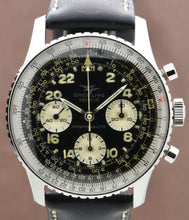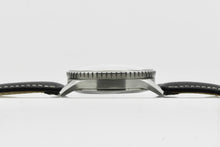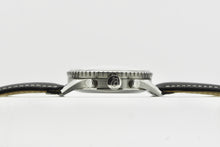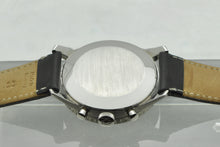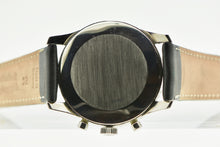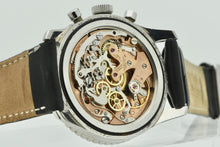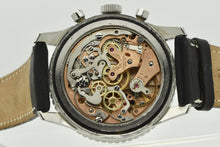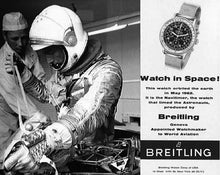
An Early Stainless Steel Pilot’s Chronograph Wristwatch from Breitling.
Model: Cosmonaute Navitimer
Reference: 809
Circa: 1965
Case: Three-body, polished and brushed, bi-directional revolving reeded and graduated bezel, lapidated lugs.
Dial: Bicolor black and silver with luminous Arabic numerals and indexes in 24 hours, subsidiary “guilloché” dials for the seconds, the 12- hour and 30-minute registers, outer graduation for the slide-rule and the telemeter. Luminous steel "bâton" hands. Dial is patinated and has turned a yellowish beige.
Movement: Venus Cal. 178, copper-colored, 17 jewels, straight-line lever escapement, monometallic balance, shock absorber, blued steel flat balance spring. Dial, case and movement signed. Diam. 41 mm. Thickness: 13 mm.
Serial: 114xxxx
Diameter: 42mm and Thickness: 14mm
This watch is very clean with what appears to be unpolished case. The reference and serial numbers are crisp. Dial has aged with thick tritium turning green. movement is clean.
More about Breitling
In the early 1950’s, Breitling released their first pilot’s watch, the ref. 806. Featuring a slide rule chronograph and the AOPA (Aircraft Owners and Pilots Association) logo, the model was called the “Navitimer”.
In 1959, Scott Carpenter was selected to be one of the original seven Mercury Astronauts. During his time as a US Navy pilot, Carpenter wore a Breitling Navitimer, and after being selected for the space mission, contacted Breitling to ask for a 24-hour version of the Navitimer. The first version of the 24-hour Navitimer was introduced in 1961, and given the same 806 reference number and featured the AOPA logo on the dial. In July of 1961, Breitling registered the name “Cosmonaute” and began producing the 24-hour Navitimer as the reference 809, however the name “Cosmonaute” was not always used on the dial.
In February of 1962, Carpenter served as backup for John Glenn during preparation for America’s first manned space flight. Carpenter flew on the second American manned space flight a few months later, in May of 1962, having received his 24-hour Navitimer Cosmonaute a few days prior to taking off. Breitling used Carpenter’s successful space flight in their advertisements of the Cosmonaute, showing the same black dial/black subsidiary dials combination that Carpenter wore.
By the end of 1962, the reference 809 Cosmonaute was produced with a number of different dial signatures – some with “Cosmonaute”, some with “Navitimer”, some with the Breitling “B” logo and some with the AOPA logo. Between the end of 1962 and into 1963, Breitling began to update the dial, using silvered subdials to contrast with the black dial, and slimmer hands. By 1964, Breitling replaced the bezel, using a coin-edge instead of the “beads of rice”.
The present watch is an excellent example of an reference 809, with a beautifully aged dial. The outer slide rule has developed a light golden patina, which contrasts nicely against the black dial, subdials, and white AOPA logo. Reference 809 Cosmonautes are highly sought after. While the model was produced at the time for the specific purpose of being taken into space, its place in history and timeless design make it wearable today at any occasion.








